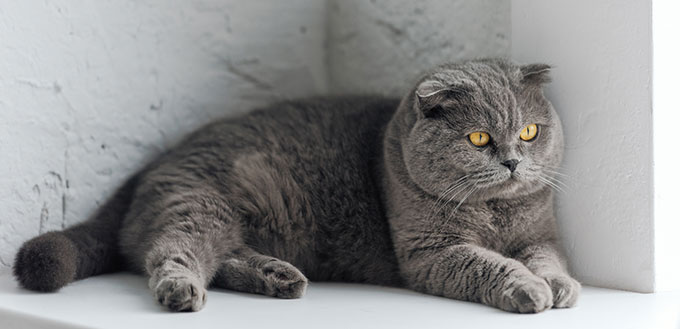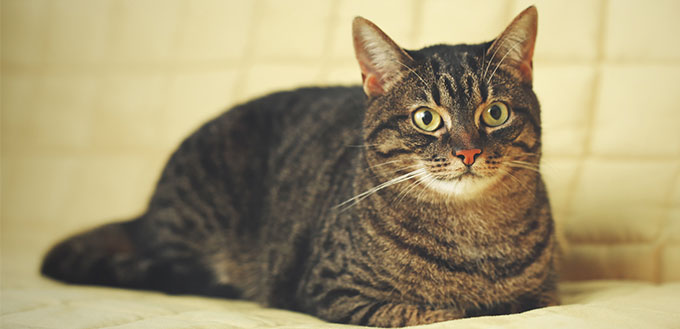Among us humans, headaches are an incredibly common ailment, but did you know that our pets may suffer from them too? Headaches are caused by a variety of triggers, from pulled neck muscles to dehydration. Since our feline friends have this same ‘hardware’, it’s very likely that cats experience them, too. Headaches are usually nothing to worry about, and will typically go away on their own, but certain pain-related behaviors can be symptoms of a larger issue at play.
Below, we run through everything you need to know about cat headaches: what could trigger them, potential symptoms, and how to help your cat when you suspect they’re in pain.

Symptoms
Headaches are a mysterious entity – even in humans – and it’s unclear whether, and to what extent cats suffer from them. Unlike people, cats can’t describe their symptoms using language, so headaches are much more elusive to diagnose.
That being said, when cats are in pain they’ll display some fairly universal behaviors and symptoms, helping you to spot when something is wrong.
- Seclusion
Many animals prefer to have some privacy when they’re in pain, and cats are no different. A cat experiencing pain or discomfort will seclude themselves from people and other animals in the household, often in a cozy spot. If you notice your cat exhibiting this behavior, look carefully to see if they’ve adopted a haunched position, which further indicates pain.
- Loss of Appetite
Many of prefer to avoid food when we have a bad headache, and our cats are quite similar. If you notice a change to your cat’s appetite, this could be a sign they’re experiencing some pain – possibly a headache. If your cat refuses to eat for more than a day or so, it’s vital that you seek immediate veterinary attention. When cats stop eating, their body burns through its protein reserves pretty fast, leaving behind only fat. When metabolized by the liver, this fat can trigger a serious condition known as hepatic lipidosis, which can eventually result in liver failure and even death.
- Sensitivity to Touch
Some vets suspect that when animals avoid being touched, this could be the sign of a headache. If your cat is usually affectionate and suddenly withdraws from your touch, they may be suffering from a nasty headache.
- Defensive Behavior
When animals are in pain, they’re naturally defensive – instinctive response to avoid further discomfort. In cats, this defensive behavior may take the form of cringing, flattened ears, a warning hiss, or backing away from you. If your cat is usually friendly, this is a sure sign that something isn’t quite right.
- Hyperactivity
Although some pets hide away when they’re in pain, others might react in the opposite way. Pacing and fidgeting are both common signs that an animal is in pain, discomfort, or distress. Unaccompanied by any physical symptoms, this behavior could well reveal a headache.
- Panting
In humans, overheating is a common headache trigger, and many vets suspect that the same is true for cats and dogs. Panting is a common sign that your cat is too hot, and may also suggest a headache.
- Accidents
If your cat is well trained in the art of litter boxes, accidents around the house could suggest some sort of ailment. This sort of behavior could also be a sign of digestive distress, so it’s a good idea to consult your vet if the accidents continue.
- Loud Meowing
Many cats are not very vocal, so if you notice them meowing loudly, or for a long stretch of time, this could be a sign of pain. Bear in mind that vocal cats are sometimes attempting to attract a mate. If your pet has not been neutered, this loud meowing is probably normal.
- Red Gums
If they’re in pain, your cat may not allow you to examine their mouth. If they do, look out for red, inflamed gums. This can be a symptom of tooth pain, overheating, or carbon monoxide poisoning, all of which have the potential to trigger a headache.
If your cat exhibits one or more of these behaviors or symptoms, they’re probably experiencing some sort of pain, and it’s a good idea to consult with your vet as soon as you can if they persist.
Causes
Despite their ubiquity, headaches are a mysterious condition. Experts suspect that the following triggers could cause headaches in animals:
- Neck or Head Trauma
If your cat has sustained a bump on the head or pulled a muscle in their neck, this could well result in a headache.
- Collars
If your cat wears a collar or harness, this could trigger a headache. Collars can become caught or furniture or branches, and harnesses may be tugged too hard during a walk. This mild trauma could result in head pain.
Related Post: Best Cat Collars
- Allergies
Many humans who suffer with allergies can experience headaches as a symptom. Since cats can have allergies, too, vets believe that the condition could trigger head pain.
- Heat Exhaustion
When humans overheat, we experience a range of symptoms, usually topped off with a nasty headache. Since cats can overheat, too, logic suggests that a feline headache could ensue.
- Chemicals
Exposure to certain chemicals can trigger headaches in humans, and most likely other mammals. These chemicals include:
- Carbon monoxide – formed during incomplete combustion
- Pesticides
- Fertilisers
- Monosodium Glutamate
- Change
It’s not uncommon for us humans to experience stress headaches, and this may also be true of our feline friends. A significant change, such as losing a household member or moving home, could trigger stress headaches in your cat.
- Tumors
Although most headaches are harmless, more severe cases may suggest the presence of a tumor, whether benign or malignant. When tumors grow, they cause additional pressure and inflammation that can result in localized pain – sometimes in the head region.
- Dehydration
Cats should be given constant access to clean, fresh water. If they become dehydrated, this can result in urinary tract diseases, bladder stones, kidney disease, and possibly headaches.
- Fasting
It’s not uncommon for us humans to develop a headache when we go too long without eating, and the same could be true of cats. However, if your cat isn’t eating, headaches should be relatively minor concern, and you should seek veterinary advice as soon as possible.

Treatment
If you suspect that your cat may have a headache, don’t panic. There’s plenty you can do to support them as they recover.
- Provide a Quiet Spot
When we’re suffering from headaches, a quiet space to recover can be exactly what we need. You can also take this approach with your pet, by taking them to a quiet, comfortable and secluded spot, checking up on them every now and then.
- Help them Hydrate
As mentioned above, dehydration can certainly cause headaches in humans, and possibly in cats, too. To rule out dehydration, be sure to offer your cat fresh water wherever they are. Even if a headache isn’t the problem, proper hydration is an important aspect of feline health overall.
Related Posts: Best Cat Water Fountains and Best Water Bowl for Cats
- Offer Light Food
If your cat appears to be in pain, comforting them with a treat or two could help them to relax and recover. Encouraging them to eat can also help to prevent issues such as hepatic lipidosis. Finally, seeing whether your cat is willing to eat can help with the diagnostic process.
Related Post: Best Cat Treats
- Encourage gentle Exercise
Sometimes a little gentle stretching can relieve certain kinds of headaches, so if you think they’re up to it, it may be a good idea to get your cat moving. You could coax them for a gentle stroll about the house with treats of their favorite toy – just be careful not to encourage overexertion, and stop if they seem distressed by your attempts.
Related Post: Best Cat Toys
- Avoid Human Treatments
Cats should never be given drugs containing acetaminophen, such as Tylenol. Even in very small doses, acetaminophen can seriously harm cats – their bodies don’t metabolize the substance in the same way that humans can, and as a result their red blood cells can become damaged.
- Know when to see a Vet
If your pet displays one or more of the behaviors listed above for more than half a day or so, chances are that something more serious than a headache is at play. If symptoms persist, try to briefly note down exactly what they are, when they began, and whether they’ve intensified. This simple process will make the diagnostic process run more smoothly when you visit the vet.
Unfortunately, cats can suffer from a broad range of conditions, so it’s difficult to tell what’s wrong without the input of a professional. That’s why it’s important to always speak to a vet if in doubt.
To Sum Up
Headaches are surprisingly elusive, and without the ability to tell us their symptoms, it’s unclear whether or not cats can experience them. Nonetheless, as mammals cats have the same muscles, blood vessels, and nerves that we do. This means they at least have the capacity to feel a headache.
If you notice your cat exhibiting unusual, pain-related behavior, it’s possible that a headache is the culprit. In this case, it’s a good idea to support your cat with a quiet resting spot and plenty of water, before seeking veterinary help if their condition does not improve.
Note: The advice provided in this post is intended for informational purposes and does not constitute medical advice regarding pets. For an accurate diagnosis of your pet's condition, please make an appointment with your vet.







